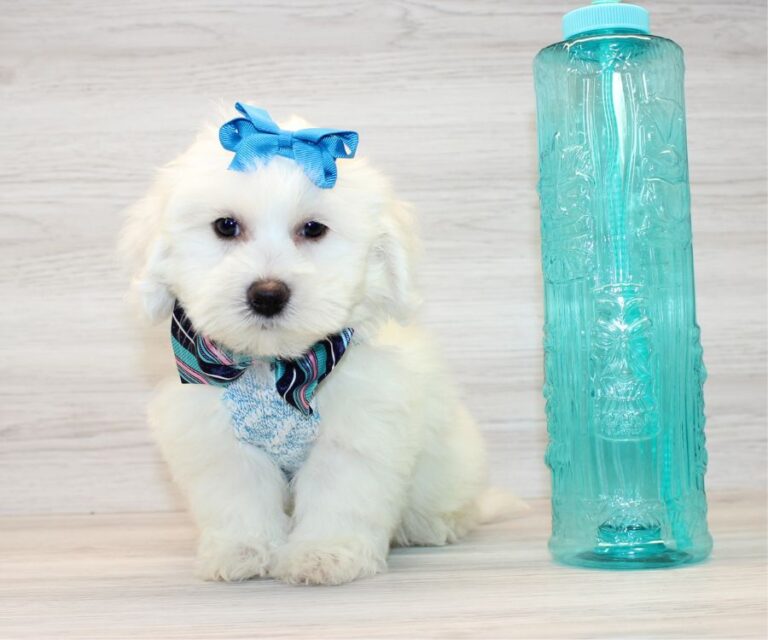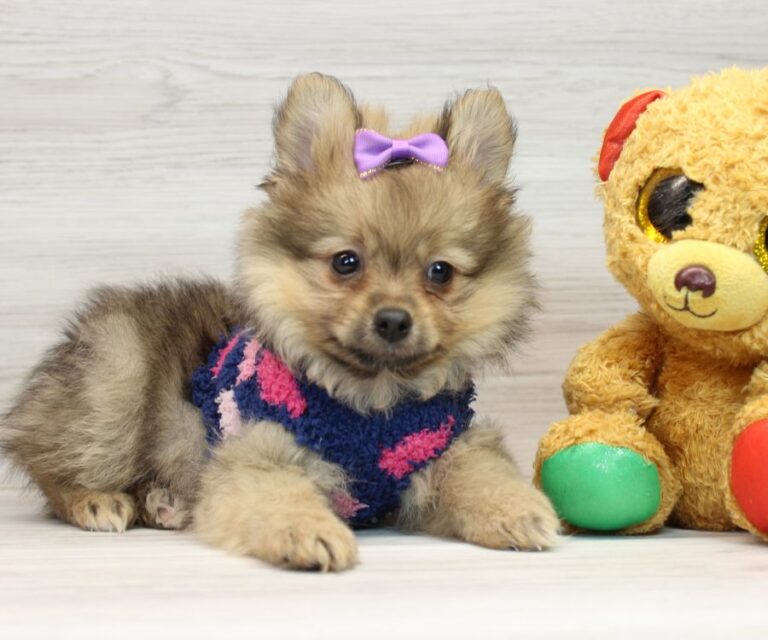You’re searching for the perfect petite companion, and Puppyheaven.com in Parkland, FL, offers a delightful range of toy and teacup puppies. These puppies are ideal for smaller living spaces, adding a bundle of joy and affection to your life. Before choosing, it’s important to understand that despite their small size, toy and teacup puppies require specific care, including regular veterinary visits to manage common health issues like hypoglycemia and dental problems. Selecting the right breed involves considering their exercise and social needs, temperament, and expected size. Ensuring you’re prepared will lead to a happier, healthier life for your new furry friend. Exploring further will uncover even more insights into making your pet’s life wonderful.
Why Choose Toy & Teacup Puppies
Choosing toy and teacup puppies presents you with a unique blend of companionship and convenience, perfect for smaller living spaces. These diminutive dogs bring a wealth of joy and affection into your life, making them ideal for individuals or families residing in apartments or homes with limited space. When you’re contemplating a pet that fits seamlessly into your lifestyle without the need for extensive accommodation adjustments, these puppies stand out as an ideal choice.
One critical aspect to take into account is their personality traits. Toy and teacup puppies are often spirited and loyal, forming strong bonds with their owners. They typically display a playful yet manageable temperament, which makes them excellent companions for those who may spend a lot of time at home. Their size and behavior are suited to indoor living, requiring less exercise than larger breeds, yet they still thrive on interaction and mental stimulation.
Furthermore, their space requirements are minimal. Unlike larger breeds, toy and teacup puppies don’t need vast areas to roam and play. A small yard or even indoor play areas suffice for their physical exercise needs. This makes them not only adorable and loving pets but also practical choices for those looking to minimize their pet’s living footprint.
Selecting the Right Breed
While taking into account the size and personality of toy and teacup puppies is important, you’ll also need to carefully select the right breed to match your lifestyle and expectations. Focusing on breed temperament and size considerations will help guarantee a harmonious match between you and your new furry friend.
Here are key points to take into account when choosing the right breed:
- Activity Level: Some breeds require more physical activity than others. Be sure you’re capable of meeting their exercise needs.
- Social Needs: Evaluate how sociable the breed is. Some puppies thrive on constant interaction, while others are more independent.
- Training Requirements: Consider how easy or challenging it’s to train the breed. This can greatly impact your daily routine and the quality of your life together.
- Temperament: Research the general temperament of the breed. You’ll need a puppy that complements your personality and coping style.
- Size Growth: Understand the expected full-grown size of the breed. Even small puppies can grow larger than anticipated, affecting space and care requirements.
Health Considerations
When choosing a toy or teacup puppy in Parkland, FL, it’s important to be aware of their specific health challenges. You’ll want to familiarize yourself with common health issues these small breeds face and understand preventive care tips to keep them healthy.
Being proactive about your puppy’s health can lead to a happier, longer life for your new pet.
Common Health Issues
Toy and teacup puppies, though irresistibly adorable, often face several breed-specific health issues that you should be aware of. Due to their small size and breeding practices, these pups may come with genetic predispositions that can affect their quality of life. Exercise limitations must also be considered, as their tiny frames aren’t suited for strenuous activities.
Common health issues include:
- Dental Problems: Due to their small mouths, overcrowding of teeth is common.
- Hypoglycemia: Their tiny size can lead to low blood sugar levels.
- Patellar Luxation: A condition where the kneecap dislocates easily.
- Respiratory Issues: Small nasal passages can lead to breathing difficulties.
- Heart Problems: They’re prone to various cardiac conditions.
Being informed helps you better serve these vulnerable pets.
Preventive Care Tips
To safeguard your puppy’s health, it’s vital to adopt proactive preventive care measures tailored to their specific needs. Establishing a consistent vaccination schedule is important. It protects against common diseases and infections that can affect your puppy’s well-being. Make sure you consult with your vet to determine the most suitable vaccinations and timing for each.
Parasite control is equally important. Regular treatments for fleas, ticks, and worms are necessary to keep your puppy healthy and comfortable. These parasites can cause severe health issues and discomfort for your puppy. By adhering to a strict protocol, monitored and recommended by your veterinarian, you’ll ensure that your puppy leads a healthy, happy life. Remember, preventive care is an act of love and responsibility.
Puppy Care Essentials
When you bring your new teacup or toy puppy home, ensuring they receive proper nutrition is critical for their development.
You’ll also want to provide a comfortable sleeping area that makes them feel safe and secure.
These steps are essential in helping your puppy thrive and adapt to their new environment.
Nutrition for Young Puppies
Proper nutrition is essential for your puppy’s growth and development during these formative weeks. As you navigate puppy weaning, shifting from mother’s milk to solid foods, it’s important to adhere to a structured feeding schedule. This will guarantee your little one receives the balanced diet necessary for healthy development.
Key aspects to ponder include:
- High-Quality Puppy Food: Choose formulas specifically designed for puppies.
- Regular Feeding Times: Establish consistent feeding schedules to stabilize their metabolism.
- Appropriate Portions: Avoid overfeeding; follow the recommended portion sizes.
- Balanced Diet: Ensure the food includes a mix of protein, fats, and carbohydrates.
- Hydration: Provide constant access to fresh water, especially after moving to dry food.
Comfortable Sleeping Arrangements
After making sure your puppy is well-nourished, it’s equally vital to focus on their sleeping arrangements to support peak health and comfort. Choosing the right bedding materials can greatly enhance their sleep quality. Opt for soft, hypoallergenic fabrics that provide warmth and a sense of security. Make sure the bedding is regularly cleaned to prevent allergens and pests.
Establishing consistent nighttime routines also plays an important role. Train your puppy to sleep at the same time and place every night. This consistency helps regulate their sleep patterns and reduces anxiety. A calm, designated sleeping area away from high-traffic zones allows them to relax fully.
Training Your Tiny Pup
Training your tiny pup requires patience and consistent reinforcement to guarantee they learn effectively and safely. Establishing clear potty routines is essential, helping your puppy understand where and when it’s appropriate to relieve themselves. Recognizing and responding to their behavioral cues promptly can greatly aid in this process.
Here are some focused strategies to enhance your training efforts:
- Consistent Schedule: Keep feeding and potty times consistent. Puppies thrive on routine, which eases their training.
- Positive Reinforcement: Reward desired behaviors with treats, praise, or playtime to reinforce good habits.
- Short Training Sessions: Keep training sessions short and engaging. Puppies have short attention spans, so frequent, brief sessions are more effective.
- Clear Commands: Use simple, consistent commands for each action you want your pup to learn. This avoids confusion and helps your puppy learn faster.
- Socialization: Introduce your puppy to various environments, people, and other pets. This builds confidence and behavioral adaptability.
Nutritional Needs
When selecting food for your toy or teacup puppy, it’s essential to comprehend their unique nutritional needs. They require a balanced diet rich in essential nutrients to support their rapid growth and high energy levels.
Additionally, you’ll need to take into account special dietary considerations to prevent health issues that can arise from improper feeding.
Essential Nutrients Required
Understanding the essential nutrients required for your toy or teacup puppy is important to their development and overall health. To prevent puppy allergies and adhere to proper feeding schedules, you’ll need to be meticulous about their diet. Here are the essential nutrients they require:
- Proteins: Essential for tissue repair and growth.
- Fats: Provide energy and support brain development.
- Carbohydrates: Help fuel daily activities and maintain intestinal health.
- Vitamins: Necessary for immune system function and preventing diseases.
- Minerals: Important for bone health, nerve function, and overall cellular processes.
Ensuring these nutrients are balanced in their diet will help your puppy thrive, promoting a healthy, joyful life. Remember, their tiny bodies have specific needs!
Special Dietary Considerations
You’ll frequently need to take into account special dietary adaptations for your toy or teacup puppy to cater to their unique nutritional needs. Establishing precise feeding schedules is vital. These tiny companions require more frequent, smaller meals to maintain their blood sugar levels and support their rapid metabolism.
Being vigilant about allergy identification is equally important. Early on, observe your puppy’s reactions to different foods. Itching, digestive upset, or lethargy may signal a food allergy. Consult your veterinarian to pinpoint specific allergens and adjust their diet accordingly.
Socialization Tips
To guarantee your toy or teacup puppy develops into a well-adjusted adult, start socializing them early by gradually introducing them to a variety of people, places, and situations. This early exposure helps them become more adaptable and less fearful in new environments. Observing their behavioral cues during these interactions is vital to understanding their comfort levels and adjusting their experiences accordingly. Puppy playdates are an excellent way for your little one to learn appropriate social behaviors from other dogs.
Here are some practical tips to enhance your puppy’s social skills:
- Introduce Diversity: Regularly expose your puppy to different types of people, including children, elderly individuals, and people of various appearances and behaviors, to foster a well-rounded temperament.
- Safe Environments: Choose safe, controlled settings for initial social encounters to ensure positive experiences.
- Consistent Interaction: Daily social interaction can prevent your puppy from developing anxiety or aggression.
- Puppy Classes: Enroll them in puppy classes where they can interact with other dogs under professional supervision.
- Positive Reinforcement: Use treats and praise to reward your puppy for good social behavior, reinforcing positive interactions.
Common Health Issues
While toy and teacup puppies often capture hearts with their size, they’re also prone to specific health issues that require attentive care. You’ll need to be vigilant about genetic predispositions that can affect these tiny treasures. Common conditions include respiratory problems, heart defects, and hypoglycemia, which is particularly important due to their small body mass and high metabolic rate.
Dental issues are also prevalent due to their small mouths holding the same number of teeth as larger breeds, leading to overcrowding and increased risk of periodontal diseases. Regular veterinary visits are essential for maintaining their oral health and overall well-being. Additionally, because of their delicate bone structure, they’re more susceptible to injuries and bone fractures. Gentle handling and a safe environment are key to preventing accidents.
Lifespan concerns are another important aspect to consider. While these pups can be long-lived companions, their life expectancy can be significantly influenced by how well their health issues are managed. It’s important to work with a vet who understands the unique challenges these breeds face. By being proactive and informed, you can help ensure a healthier, happier life for your pint-sized pal.
Finding the Right Breeder
Selecting the appropriate breeder is essential when you’re searching to adopt a toy or teacup puppy, as it has a significant effect on your new pet’s health and happiness. It’s important that you choose someone who not only cares deeply about their animals but also adheres to the highest standards of ethical breeding practices.
To assist you in making an informed decision, consider these key factors:
- Breeder Credentials: Make sure the breeder is licensed and has a positive reputation. Check for any professional affiliations and certifications that validate their expertise.
- Inspection Reports: Ask for recent inspection reports that demonstrate compliance with local, state, and federal regulations. This transparency is crucial in verifying their commitment to animal welfare.
- Health Guarantees: A trustworthy breeder will offer a health guarantee for their puppies. This shows they stand behind the health of their animals.
- Open Communication: You should feel comfortable asking questions and expect clear, informative answers. A reputable breeder will be keen to share information about their breeding practices.
- Post-Adoption Support: Look for breeders who provide ongoing support and are available to help you with any post-adoption queries or concerns.
Choosing the right breeder isn’t just about finding a healthy puppy; it’s about starting a joyful journey with a new family member, knowing you’ve done your part in promoting responsible pet ownership.
Puppy Adoption Process
Understanding the puppy adoption process is essential as you prepare to welcome a new member into your home. First, you’ll need to contemplate the puppy temperament that aligns with your lifestyle and household. Each puppy has a unique personality, some may be energetic and playful, ideal for active families, while others might be calm and gentle, a better match for quieter homes.
After you’ve identified a potential puppy, you’ll encounter the adoption fees. These fees aren’t just a price tag; they represent the breeder’s commitment to raising healthy, well-socialized puppies. They typically cover initial veterinary care, vaccinations, and sometimes spay/neuter procedures, ensuring your puppy has a healthy start in life.
The adoption process also involves a thorough application designed to make sure that you and the puppy are a perfect match. You’ll likely need to provide references and undergo a home visit. This step is important, as it helps guarantee that the puppies are placed in loving, supportive environments.
Lastly, prepare yourself for a lifelong commitment. Adopting a puppy isn’t just about bringing joy into your home; it’s about providing a nurturing, caring environment for your new furry friend for years to come.
Conclusion
As you begin the journey of adopting a toy or teacup puppy, keep in mind the importance of selecting a reputable breeder and understanding the unique needs of these tiny companions.
They require diligent care, from specialized training to proper socialization and awareness of potential health issues.
By thoroughly preparing and continually educating yourself, you’ll guarantee a happy, healthy life for your new furry friend.
Welcome this delightful addition to your family with confidence and love.




















